🇦🇺 Australia
🇨🇦 Canada
🇨🇿 Czechia
🇩🇰 Denmark🇪🇪 Estonia
🇮🇪 Ireland
🇮🇱 Israel
🇮🇹 Italy
🇯🇵 Japan
🇲🇽 Mexico
🇵🇱 Poland
🇰🇷 South Korea
🇨🇭 Switzerland
🇬🇧 United Kingdom
🇺🇸 United States of Americaand more
🇦🇺 Australia
🇨🇦 Canada
🇨🇿 Czechia
🇩🇰 Denmark🇪🇪 Estonia
🇮🇪 Ireland
🇮🇱 Israel
🇮🇹 Italy
🇯🇵 Japan
🇲🇽 Mexico
🇵🇱 Poland
🇰🇷 South Korea
🇨🇭 Switzerland
🇬🇧 United Kingdom
🇺🇸 United States of Americaand more
Sporaxol capsules 100 mg, pack of 10 pcs.
$34.93
Sporaxol (itraconazole) – systemic antifungal medication that disrupts fungal cell growth by inhibiting ergosterol synthesis.
-
— or —
“Sporaxol” capsules are used for the following indications:
- candidiasis;
- tinea versicolor;
- dermatophytosis caused by itraconazole-sensitive pathogens (Trichophyton spp., Microsporum spp., Epidermophyton floccosum), for example, tinea pedis, inguinal tinea, tinea corporis, tinea corporis of the hands;
- oropharyngeal candidiasis;
- onychomycoses caused by dermatophytes and/or yeasts;
- histoplasmosis;
- systemic mycoses (in cases where first-line antifungal therapy cannot be used, or in case of ineffectiveness of treatment with other antifungal drugs, which may be due to the existing pathology, insensitivity of the pathogen or toxicity of the drug): aspergillosis and candidiasis; cryptococcosis (including cryptococcal meningitis): treatment of immunocompromised patients with cryptococcosis and all patients with cryptococcosis of the central nervous system; maintenance therapy in patients with AIDS to prevent relapse of an existing fungal infection;
- Itraconazole is also prescribed for the prevention of fungal infection in patients with prolonged neutropenia in cases where standard therapy is insufficient.
Composition
The active substance is itraconazole (one capsule contains 100 mg of itraconazole).
Excipients: spherical sugar (sucrose, corn starch, purified water), poloxamer 188, hypromellose 6 CP, poloxamer 188 micronized, capsule (indigo (E 132), quinoline yellow (E 104), titanium dioxide (E 171), purified water, gelatin).
Contraindication
- Hypersensitivity to the active substance or to any of the excipients of the drug.
- Concomitant use of itraconazole and CYP3A4 substrates is contraindicated. Concomitant use may result in increased plasma concentrations of these drugs, which may lead to increased or prolonged therapeutic and adverse reactions and potentially life-threatening conditions. For example, increased concentrations of these drugs may lead to prolongation of the QT interval and ventricular tachyarrhythmias, including cases of ventricular fibrillation, arrhythmias with a potentially fatal outcome.
- Use in patients with ventricular dysfunction, such as congestive heart failure, or a history of congestive heart failure, except for the treatment of life-threatening infections.
- The drug should not be used during pregnancy, except for the treatment of life-threatening conditions.
- Women of reproductive age taking itraconazole capsules should use reliable contraception throughout the course of treatment until the first menstrual period after its completion.
Method of application
For oral use. For optimal absorption of the drug, Sporaxol capsules should be taken immediately after meals. The capsules should be swallowed whole.
Adult treatment regimens for each indication:
- candidiasis – 200 mg 2 times a day (duration – 1 day);
- tinea versicolor – 200 mg once a day (duration – 7 days);
- inguinal ringworm, dermatophytosis of the trunk – 100 mg 1 time per day (duration – 15 days), 200 mg 1 time per day (duration – 7 days);
- dermatophytosis of the feet, dermatophytosis of the hands – 100 mg once a day (duration – 30 days);
- oropharyngeal candidiasis – 100 mg once a day (duration – 15 days);
- The dose should be increased to 200 mg once daily for 15 days in patients with neutropenia or AIDS due to impaired absorption in these patients;
- onychomycosis (infection of the nail plates on the toes with or without fingernails) – 200 mg once a day (duration – 3 months).
Optimal clinical and mycological effects are achieved 1-4 weeks after the end of treatment for skin infections, vulvovaginal and oropharyngeal candidiasis and 6-9 months after the end of treatment for nail infections. This is due to the fact that the elimination of itraconazole from skin, nail and mucous membranes is slower than from blood plasma.
The duration of treatment for systemic fungal infections is adjusted depending on the mycological and clinical response to therapy.
Systemic mycoses:
- aspergillosis – 200 mg once a day;
- candidiasis – 100-200 mg once a day;
- cryptococcosis (without signs of meningitis) – 200 mg once a day;
- cryptococcal meningitis – 200 mg 2 times a day;
- histoplasmosis – from 200 mg once a day to 200 mg twice a day;
- maintenance therapy of patients with AIDS – 200 mg once a day;
- Prevention in patients with neutropenia – 200 mg once a day.
Application features
Pregnant women
Sporaxol should not be administered to pregnant women, except in cases of life-threatening systemic leukemias, when the potential benefit to the pregnant woman outweighs the risk of adverse effects on the fetus. In animal studies, itraconazole has shown reproductive toxicity. There are limited data on the use of Sporaxol during pregnancy. During the post-marketing period, cases of developmental anomalies have been reported, which included malformations of the skeleton, genitourinary tract, cardiovascular system and organs of vision, as well as chromosomal abnormalities and multiple malformations. A causal relationship with the use of itraconazole has not been established. Epidemiological data on the effects of itraconazole in the first trimester of pregnancy (mainly in patients receiving it for short-term treatment of candidiasis) did not reveal an increased risk of developmental defects compared to women who did not use drugs with teratogenic effects.
Very small amounts of itraconazole are excreted in breast milk. Therefore, during breastfeeding, it is necessary to compare the possible risk to the child with the expected benefit of treatment with the drug “Sporaxol” for the mother. If treatment is necessary, the woman should stop breastfeeding.
Children
Since clinical data on the use of itraconazole capsules in children are limited, Sporaxol should not be prescribed to children unless the expected benefit significantly outweighs the potential risks.
Drivers
Studies on the effect on the reaction rate when driving vehicles or operating other mechanisms have not been conducted. It should be borne in mind that side effects such as dizziness, visual disturbances and hearing loss may occur, which may lead to negative consequences when driving vehicles and operating other mechanisms.
Overdose
Symptoms
Manifestations of overdose were similar to adverse reactions observed when using the drug in recommended doses.
Treatment
In case of accidental overdose, supportive measures should be taken. Activated charcoal may be administered if appropriate. Itraconazole is not removed by hemodialysis. There is no specific antidote.
Side effects
The most common adverse reactions during treatment with itraconazole capsules in clinical trials and/or reported spontaneously were headache, abdominal pain and nausea. The most serious adverse reactions were severe allergic reactions, heart failure/congestive heart failure/pulmonary edema, pancreatitis, serious hepatotoxicity (including some cases of fatal acute liver failure) and skin reactions.
Storage conditions
Store in the original packaging at a temperature not exceeding 25 °C, out of the reach of children.
Shelf life – 2 years.
You may also like


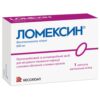
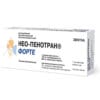
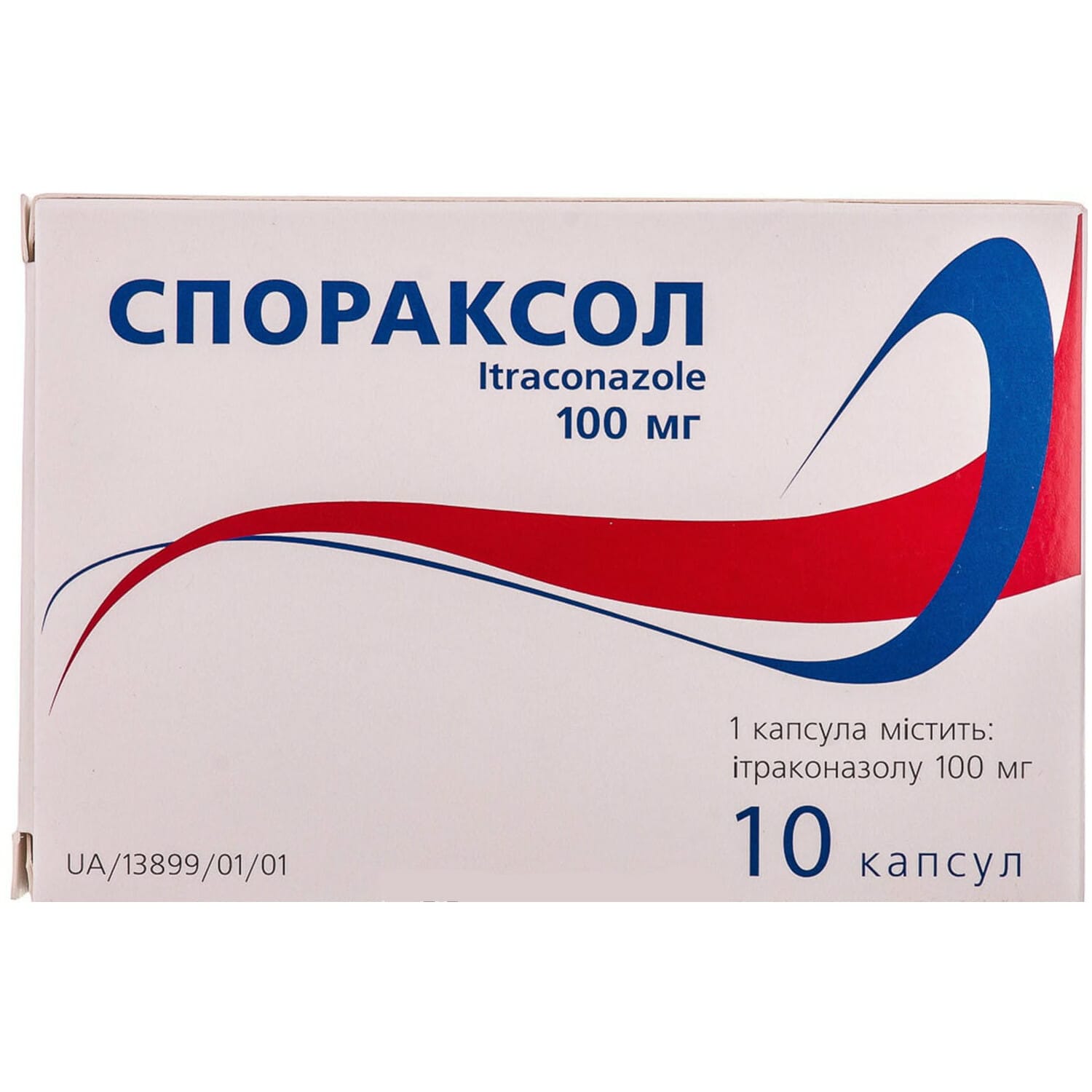

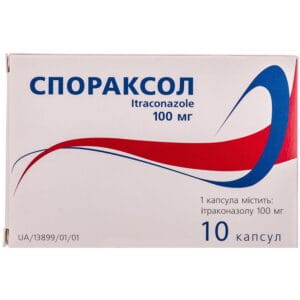

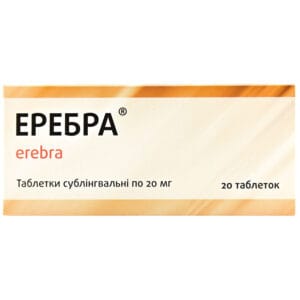
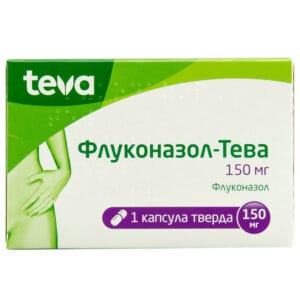


Reviews
There are no reviews yet.